Banner campaign
Latest

What next for CTP?
Report
What next for CWG for 2016? and how to Ensure bangladesh is ready for CTP at scale, at speed and across sectors by 2018? De-Brief and validation Workshop 25 November 2015
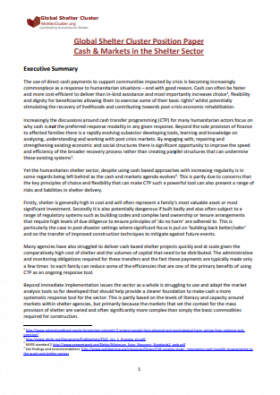
Global Shelter Cluster Position Paper: Cash & Markets in the Shelter Sector
Presentation
The use of direct cash payments to support communities impacted by crisis is becoming increasingly commonplace as a response to humanitarian situations – and with good reason. Cash can often be faster and more cost-efficient to deliver than in-kind assistance and most importantly increases choice,...

Cash and Markets In The WASH Sector
Report
Market based programming is increasingly heralded as having a critical place in the future of humanitarian programming. The proposed benefits of working through existing market systems include improvements to speed, efficiency and effectiveness of programming and increased beneficiary dignity and...

Cash transfer resilience tool
Guidelines and Tools
The objective of this tool is to help humanitarian agencies at the country level better prepare for emergency response using cash transfers. This tool aims to guide humanitarian organizations to preposition cash transfer services and implement partnership (framework) agreements with FSPs by...

Rapid Assessment for Markets: Bidibidi Refugee Settlement
Report
The Rapid Assessment of Markets (RAM) conducted within the Bidibidi Refugee Settlement and in the surrounding Ugandan towns and trading centres sheds some light upon the rapidly developing network of marketplaces within one of the world’s fastest growing refugee settlements. The RAM highligthed key...

The Mam’out Project: Seasonal Multiannual Cash Transfers for the Prevention of Acute Malnutrition in Tapoa
Report
In response to alarming rates of acute malnutrition, Action Against Hunger (ACF) initiated a project to strengthen and evaluate the prevention of acute malnutrition of children younger than 36 months in the Tapoa province, Burkina Faso. Using seasonal and multiannual unconditional cash transfers, ACF’s...

Labour Market Analysis in Humanitarian Contexts. A practitioner’s guide
Guidelines and Tools
The world and the scale of complex crises are rapidly changing, thus calling for new tools and fresh approaches. This guide aims to help humanitarians conduct better labour market analyses (LMA) to inform the design and delivery of livelihoods and market strengthening programmes in emergency crisis and...

Market Analysis and Outcome/Impact Measurement in Cash Transfer Programming in the WaSH and Shelter Sectors in Sudden Onset Disasters
Report
Over the past five years, cash transfer programming has become an increasingly popular modality of humanitarian intervention. Recently, unconditional and unrestricted MPGs have been increasingly championed as a default modality, based on evidence collected by organisations such as the...

Appropriateness and Impact of Cash Grants Distribution in Eastern Ukraine
Case Study
This programming note assesses the appropriateness and impact of cash grants distribution in Eastern Ukraine. Key findings Distribution of cash grants of US$250 – US$900 via bank transfer allowed beneficiaries to purchase or pay for a wide variety of items or services, including food, medication or...
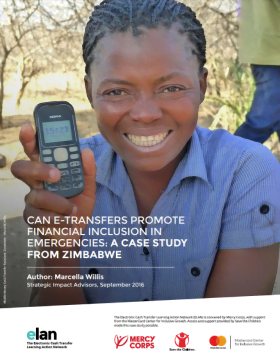
Can E-Transfers Promote Financial Inclusion in Emergencies: A Case Study from Zimbabwe
Case Study
The Electronic Cash Transfer Learning Action Network (ELAN) launched research to build an evidence base around connecting emergency electronic transfer (e-transfer) recipients with additional financial services. They wanted to learn if, when, and how e-transfers can promote sustained uptake and use...

The Revival of the “Cash versus Food” Debate: New Evidence for an Old Quandary?
Report
The longstanding “cash versus food” debate has received renewed attention in both research and practice. This paper reviews key issues shaping the debate and presents new evidence from randomized and quasi-experimental evaluations that deliberately compare cash and in-kind food transfers in ten...

Using Cash for Shelter: An Overview of CRS Programs
Report
Cash continues to gain prevalence as a modality for humanitarian agencies to help people meet multiple and diverse needs in the wake of a crisis. It provides people with the dignity of choice, and is often significantly more cost-efficient than the delivery of in-kind aid. In programs with a shelter...
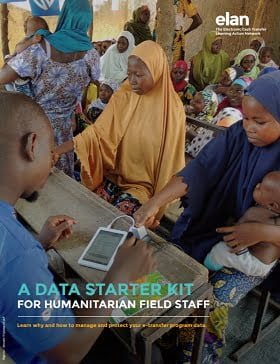
Data Starter Kit for Humanitarian Field Staff
Guidelines and Tools
A practical guide to help humanitarian field staff understand and manage data protection issues.
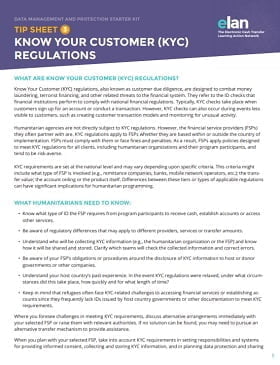
Data management and protection starter kit: Tip sheet 3: Know your customer (KYC) Regulations
Guidelines and Tools
Know Your Customer (KYC) regulations, also known as customer due diligence, are designed to combat money laundering, terrorist financing, and other related threats to the financial system. They refer to the ID checks that financial institutions perform to comply with national financial regulations....
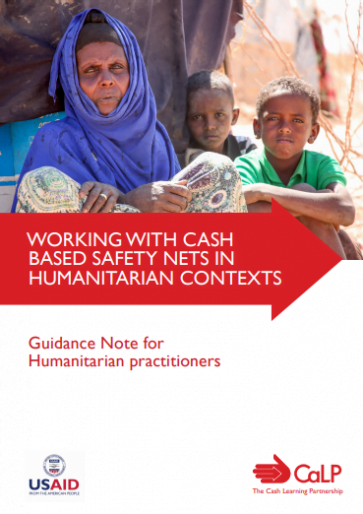
Working with Cash-based Safety Nets in Humanitarian Contexts: Guidance Note for Humanitarian Practitioners
Guidelines and Tools
Over the past decade, social protection has emerged as an important social policy measure to tackle poverty and inequality in society, and to address vulnerability to shocks. In line with these developments, there has been increasing interest in forging better links between humanitarian assistance and...
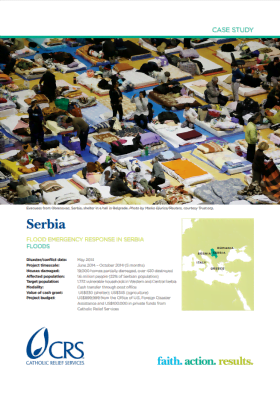
Using Cash for Shelter: Flood Emergency Response in Serbia
Case Study
The devastating floods that affected the Balkans in May 2014 affected 1.6 million people, 22 percent of Serbia’s population, and have set the country’s economic development back decades. Catholic Relief Services (CRS) conducted rapid assessments in 13 villages in the municipalities of Šabac, Valjevo,...
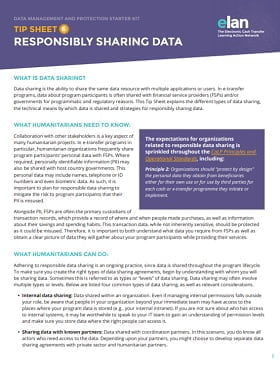
Data management and protection starter kit: Tip sheet 6: Responsibly Sharing Data
Guidelines and Tools
Data sharing is the ability to share the same data resource with multiple applications or users. In e-transfer programs, data about program participants is often shared with financial service providers (FSPs) and/or
governments for programmatic and regulatory reasons. This Tip Sheet explains the different...

Development of Training Modules on the Fundamental Concepts of Cash and Voucher Programming
Guidelines and Tools
The CALP Network is in its first year of a 5 year strategy. The first year has been marked by opening up the CALP Network’s membership to its wider community of practice, with a significant growth in membership expected in 2016,
the development of a Board of Directors, made up of up to 13...
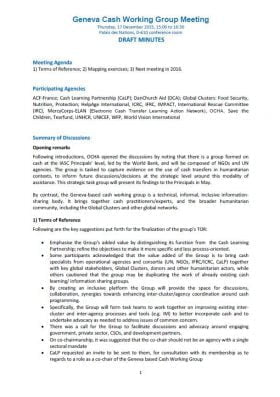
Geneva Cash Working Group Meeting Thursday, 17 December 2015 – Draft Minutes
Report
Geneva Cash Working Group Meeting Thursday, 17 December 2015 – DRAFT MINUTES

Partnering for success: What works in e-cash programs?
Blog Post
As the CALP Network readers know, cash transfer programming is growing in use in a variety of locations and situations. After years of using cash transfers, humanitarians are increasingly interested in taking advantage of electronic delivery mechanisms to offer program participants additional choice,...